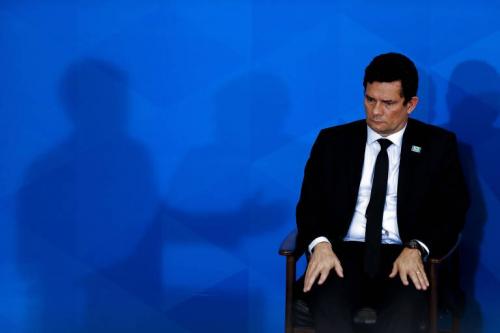Moro and the failure of the police State in Brazil
The project of the construction of a Police State is one of the three fundamental pillars of the Bolsonaro Government and its agent is judge Sergio Moro.
- Opinión

The project of the construction of a Police State is one of the three fundamental pillars of the Bolsonaro Government and its agent is judge Sergio Moro. One pillar is the ultra neo-liberalism of the Minister of economics Paulo Gredes, who guarantees the support of big business and all the defenders of neo-liberalism. This means further destruction of the country, irrespective of support in Parliament or public opinion. The second pillar are the military. Since Bolsonaro has no political party, he has renewed relations with the military to gain their support, for which he has named dozens of them to important posts in the Government.
The third pillar concerns the appointment of Moro as Minister of Justice, to bring the operation Lava Jato into the Government and make it a policy of the State, with the objective of building a Police State in Brazil. This means criminalizing social movements, parties of the left, associations of the popular camp and leftist personalities. The aim is to shield the State, so that a new 2002 – when Lula won for the first time – will no longer be possible.
One of the instruments for this, directly inherited from US Governments, is the characterization as “terrorist” of social movements that supposedly violate the right to private property – above all the Landless Workers Movement-MST – in order to attack them and attempt to destroy them.
This Government has undertaken an even more radical modality of neo-liberalism, with the destruction of public assets, the elimination of workers’ rights and the freezing of resources for social policies. This policy only serves the interests of financial capital.
An anti-popular and anti-national model such as this requires an anti-democratic political regime that seeks to prevent a new electoral defeat of the right, as has happened four times between 2002 and 2014, in democratic contests. This explains the rupture of democracy with the coup that removed Dilma Rousseff from Government, without any legal foundation, relying on the conspiratorial silence of the Judicial Power. Hybrid war was put into practice, the new strategy of the right on an international scale that includes political persecution via the manipulative application of law and the judicialisation of politics, with the legal system substituting for people’s power with its arbitrary decisions.
The coup against Dilma represented the breakdown of democracy and the establishment of a regime of exception in Brazil. The project of the Bolsonaro Government represents the intention of passing from a regime of exception to a State of exception, closing all the subsisting democratic spaces and in effect imposing a dictatorship.
This State of exception is indispensable in order to prevent the lack of popularity of the neoliberal economic policy leading, through democratic elections, to systematic defeat of the Right, as occurred in Brazil from 2002. It was necessary to resort to anti-democratic instruments, with both the coup against Dilma and the persecution of Lula, followed by the fraudulent victory in the Presidential elections.
The weakened figure of Moro, due to the denouncements of the portal The Intercept, weakens the project of the Right. The package that Moro sent to Congress, with harsh repressive measures, has increasingly less possibility of approval, as is the clumsy decree that he signed to permit the expulsion from the country of journalist Glen Greenwald of The Intercept. His whole reaction to the revelations of the conversations must have been the object of a hasty trip Moro took to the United States, from which he returned with measures that sought to distract attention from the denouncements, but which have had a contrary impact.
Breaking the pillar of the Police State of this Government is an important goal of the Brazilian democratic forces, in order to both halt the project of building a state of exception and broaden the democratic spaces that would allow the majorities to express their will, freely and democratically, for the future of the country.
29/07/2019
(Translated for ALAI by Jordan Bishop)
- Emir Sader, Brazilian Sociologist and Political Scientist, is Coordinator of the Laboratory of Public Policies of the State University of Rio de Janeiro (UERJ).
Del mismo autor
- Hay que derrotar políticamente a los militares brasileños 07/04/2022
- China y Trump se fortalecen 04/03/2022
- Pandemia e Ucrânia aceleram decadência da hegemonia norte-americana no mundo 28/02/2022
- Pandemia y Ucrania aceleran la decadencia de la hegemonía norteamericana en el mundo 28/02/2022
- La anti-política generó la fuerza de extrema derecha 22/02/2022
- Las responsabilidades del PT 10/02/2022
- Estados Unidos, más aislado que nunca en América Latina 03/02/2022
- Memoria y olvido en Brasil 27/01/2022
- 2022: tiempos decisivos para Brasil y Colombia 05/01/2022
- Brasil: una historia hecha de pactos de élite 18/12/2021








